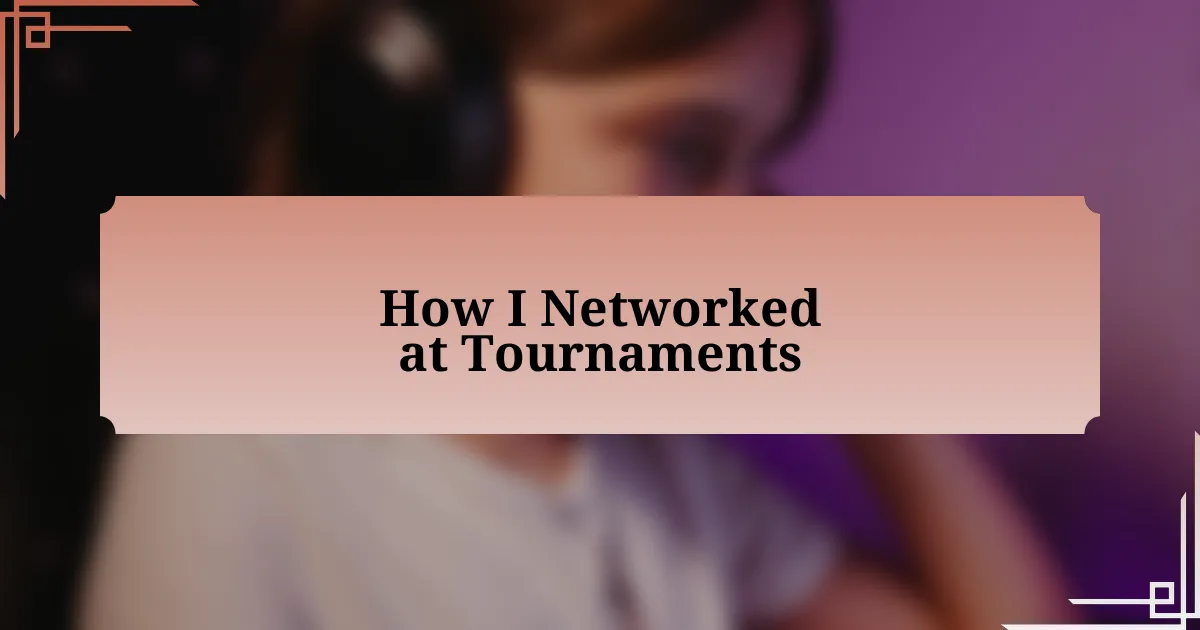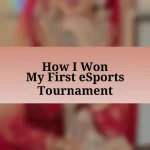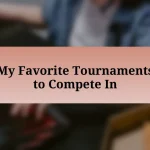Key takeaways:
- Networking in esports is about building genuine relationships that can lead to future opportunities and collaborations.
- Casual interactions and shared experiences often result in the strongest connections, enhancing the sense of community.
- Effective follow-up after events can transform casual acquaintances into lasting relationships, emphasizing personalization and timely communication.
- Approaching new contacts with clear intentions and an open demeanor fosters deeper discussions and instant connections.
Author: Evelyn Hartley
Bio: Evelyn Hartley is an award-winning author known for her compelling narratives and richly drawn characters. With a background in psychology and literature, she weaves intricate tales that explore the complexities of human relationships and the intricacies of the human psyche. Her debut novel, “Whispers in the Dark,” was celebrated by critics and readers alike, earning her a dedicated following. Evelyn’s work has been featured in various literary journals and anthologies, and she frequently speaks at writing conferences and workshops. When she’s not writing, she enjoys hiking in the mountains and volunteering at her local animal shelter. She resides in Seattle with her two rescue dogs, Luna and Milo.
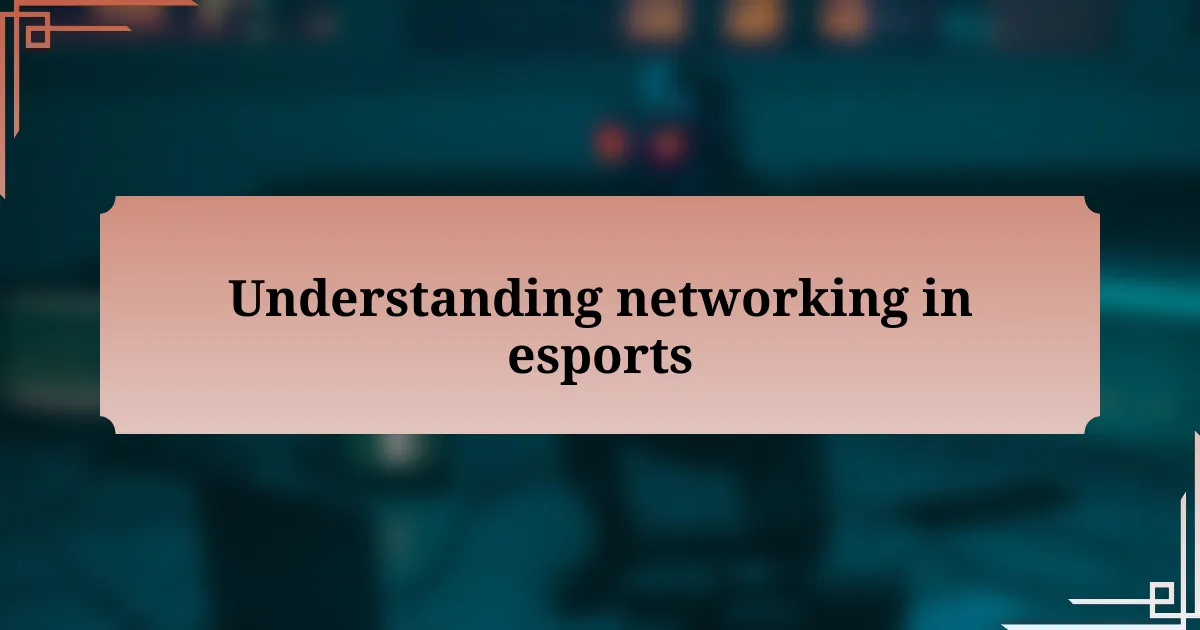
Understanding networking in esports
Networking in esports is not just about exchanging social media handles or business cards; it’s about building genuine relationships that can open doors to opportunities. I remember my first tournament where I was so nervous to approach established players. Yet, when I finally did, I discovered that most were welcoming, eager to share their experiences, and looking to connect too. Have you ever considered how a single conversation can change your entire trajectory in this industry?
The beauty of networking in this realm lies in its community-driven nature. Each tournament is a melting pot of players, fans, and industry insiders. I vividly recall chatting with a game developer at a smaller event; it turned into a discussion about my gameplay strategy and the features players wanted to see. That moment reinforced my belief that authentic interactions can lead to invaluable insights and collaborations. Isn’t it rewarding to think that the person next to you could become a pivotal figure in your career?
Moreover, networking isn’t just limited to formal settings. I’ve found that the casual moments, like sharing laughs during downtime or discussing a match over dinner, often result in the strongest connections. These shared experiences foster trust and camaraderie, making it easier to reach out later for advice or opportunities. Have you taken the time to engage in those laid-back conversations? Sometimes, they are where the magic happens.
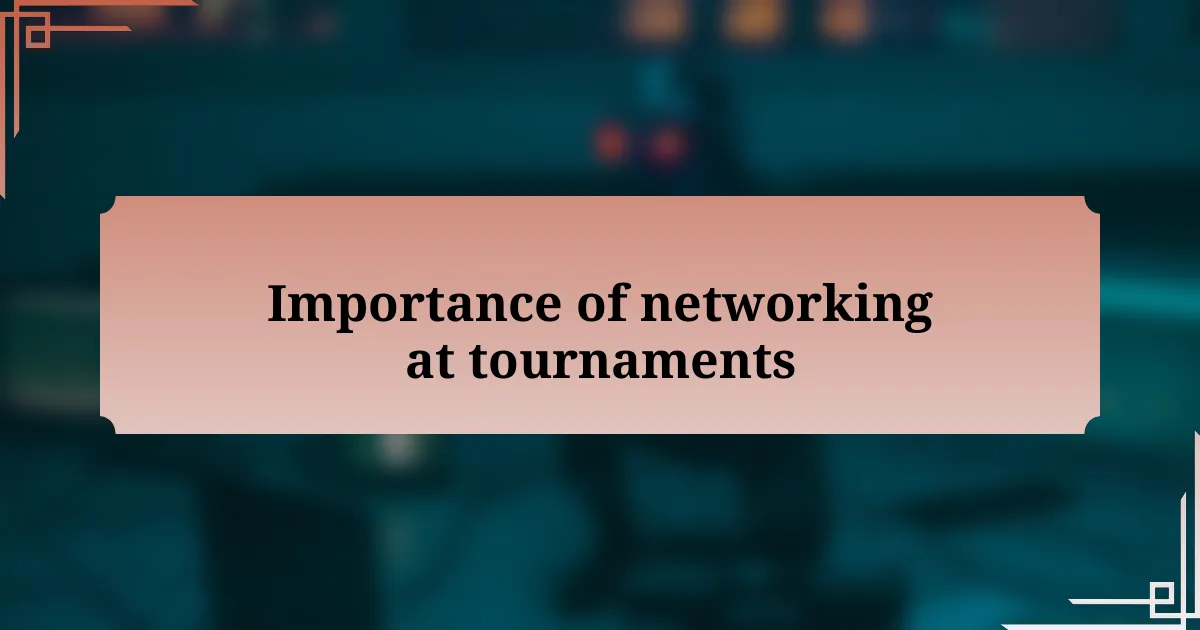
Importance of networking at tournaments
Participating in tournaments offers a unique opportunity to form connections that extend beyond the gaming arena. I recall one time I was sitting in the stands, feeling excited yet apprehensive about my performance. An unexpected conversation with a fellow competitor turned into a brainstorming session about strategies and upcoming tournaments. It dawned on me that these interactions were just as vital as practice; they broadened my perspective and helped build a sense of community that’s essential in esports.
The relationships forged at these events can be crucial in navigating the complexities of the esports landscape. I once worked with a player I’d met casually during a match, and we ended up collaborating on a project that gained far more traction than I anticipated. This made me realize how vital networking is—it’s not just about the immediate benefits of meeting someone; it’s about cultivating partnerships that can lead to innovative projects down the line. Have you thought about how many future collaborations could arise from a simple conversation today?
Moreover, establishing a network can provide emotional support during challenging times in your esports journey. I remember one particular event where I faced a tough loss; I felt utterly defeated. But, through my network, I connected with others who had faced similar challenges. Sharing our stories provided a sense of camaraderie and motivation. Can you think of how sharing experiences with others who understand your struggles could elevate your journey? It’s these connections that truly enrich the esports experience.
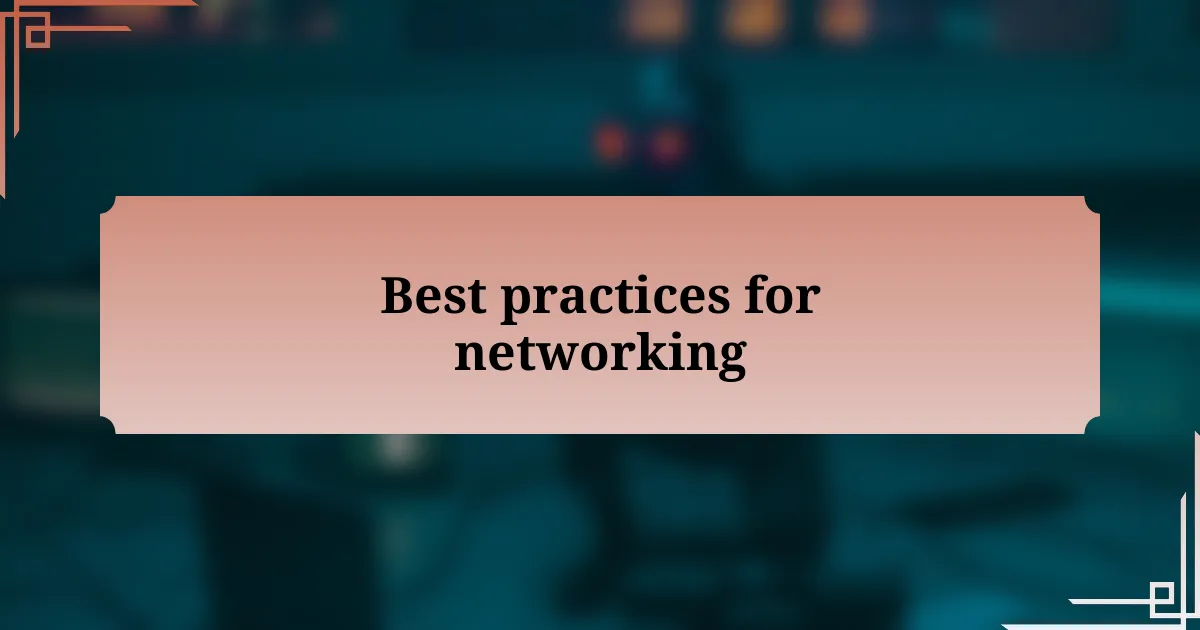
Best practices for networking
Building a robust network at tournaments requires being approachable and genuinely interested in others. I still remember reaching out to a player who was sitting alone, and we ended up discussing our favorite games and strategies for hours. That connection not only led to valuable insights but also to a friendship that transcended the tournament. Have you considered how a simple smile or introduction can open doors you never knew existed?
Maintaining a presence on social media can also amplify your networking efforts. I often share tournament highlights and my thoughts on game strategies online. These posts have attracted attention from fellow gamers and even potential sponsors. When was the last time you reached out to someone online after meeting them at an event? Those small gestures can enhance relationships and keep the conversation going long after the tournament ends.
Lastly, remember the power of follow-up. I used to think that once the tournament wrapped up, that was it. However, I started sending messages to people I met, sharing a memorable moment from our conversations. This simple act transformed casual acquaintances into lasting relationships. What could be your next step after making a connection? Making that effort can turn fleeting moments into fruitful partnerships.
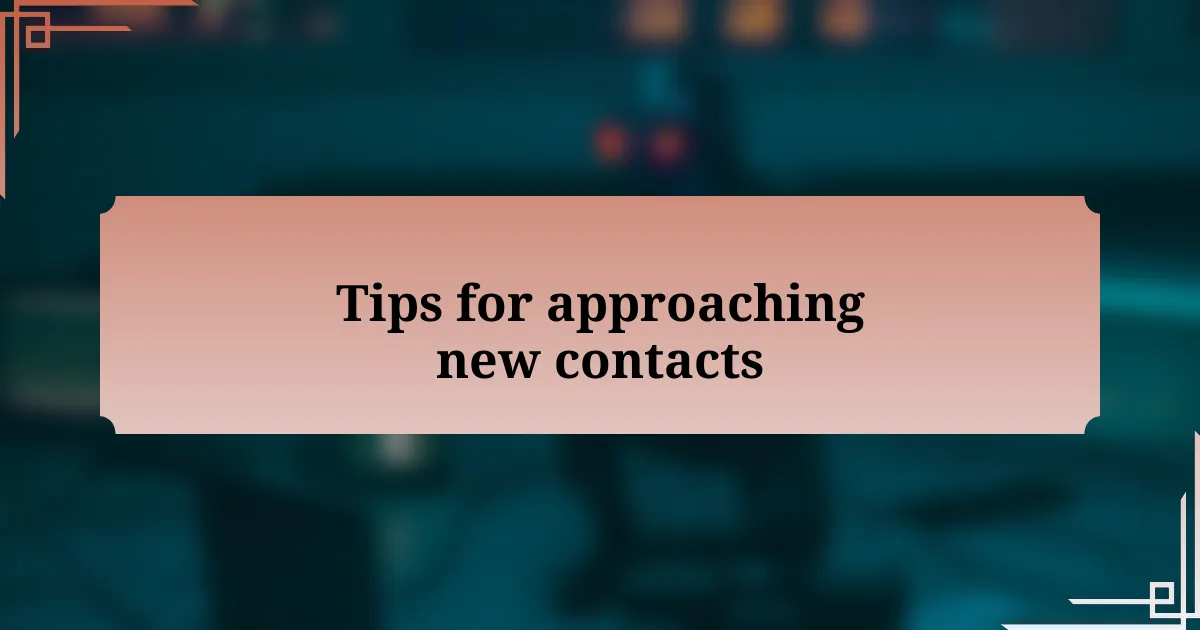
Tips for approaching new contacts
When it comes to approaching new contacts, I find that having a clear intention can really set the stage for a meaningful interaction. For example, I remember a tournament where I spotted a player known for their incredible skills. Instead of just complimenting their gameplay, I asked a specific question about their strategy in a recent match. This showed my genuine interest and sparked an engaging conversation. Have you ever thought about how targeting your questions can lead to deeper discussions?
Another tip is to observe the surroundings and look for common ground. At one event, I noticed a group huddled around a console, intensely discussing new game mechanics. Rather than hesitating, I stepped up and joined in. Sharing a laugh over a game-related mishap immediately broke the ice. Isn’t it amazing how shared experiences can create instant connections?
Lastly, body language plays a crucial role in approaching new contacts. I once approached someone who seemed hesitant to engage, so I made sure to maintain open and inviting body language. I leaned in slightly, smiled, and kept my tone light. This approach helped ease their nerves, and soon we were chatting like old friends. Have you ever noticed how subtle cues can either invite or repel connection?
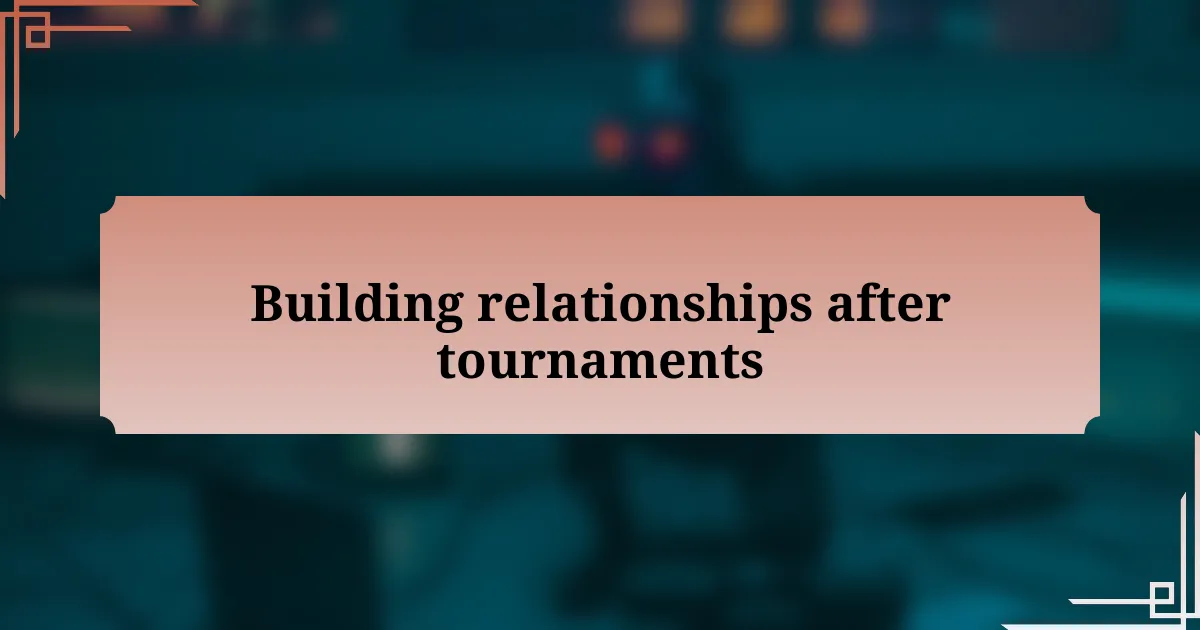
Building relationships after tournaments
After a tournament wraps up, the challenge shifts from making initial connections to nurturing those relationships. I remember after one event, I followed up with a player I admired by sending a direct message on social media, sharing my thoughts on their performance. They responded positively, and we ended up discussing strategies and future events. Doesn’t it feel rewarding to connect on a deeper level?
Engaging with new contacts can take many forms beyond the initial conversation. I often invite my new connections to join online gaming sessions or watch streams together. This shared activity not only reinforces our bond but also opens up more opportunities for collaboration or planning future tournaments. Have you ever considered how gaming together can strengthen relationships?
Building relationships also involves offering support and encouragement. At one tournament, I learned that a fellow gamer was struggling with confidence after a tough match. I reached out to boost their spirits and share my own experiences of bouncing back. Those moments of vulnerability can truly solidify friendships, don’t you think? It’s these genuine gestures that help in creating lasting networks in the eSports community.
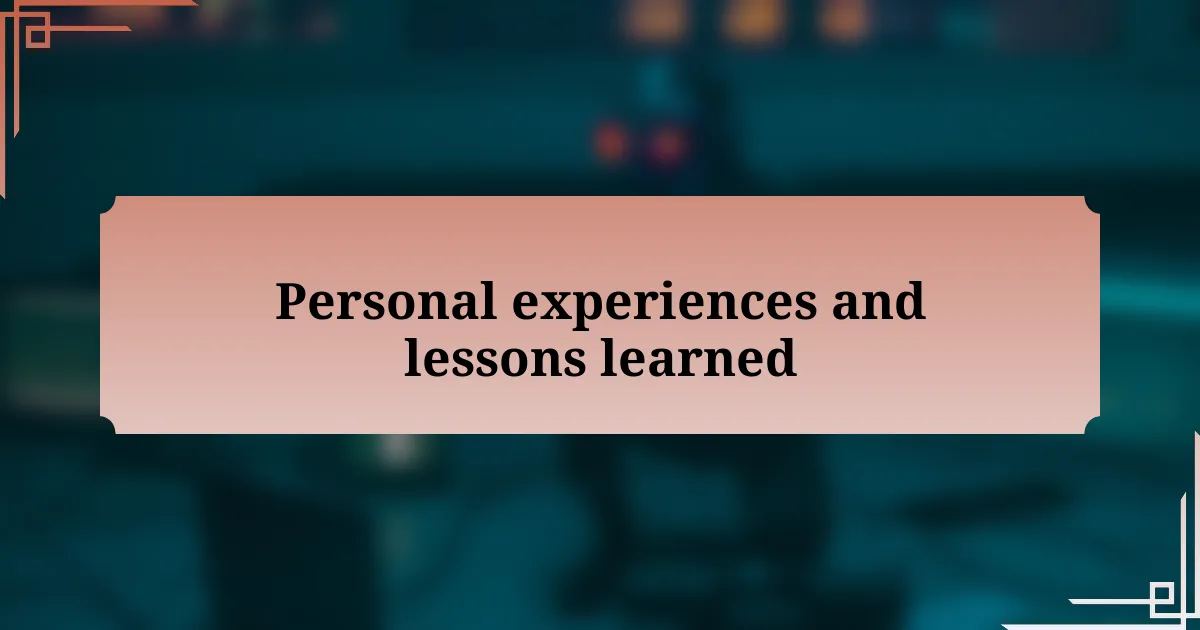
Personal experiences and lessons learned
During one tournament, I found myself sitting next to a competitor who seemed to be just as nervous as I was. We struck up a conversation, sharing our thoughts on the gameplay and the pressure we felt to perform. That simple exchange made me realize how many players are looking for a connection, even in a competitive environment. Have you ever felt that shared anxiety create an instant bond with someone?
I recall a moment at a networking event where I hesitated to approach a well-known player. It felt intimidating, but I remembered a piece of advice: be genuine. I took a deep breath, introduced myself, and shared how their gameplay inspired me. To my surprise, they were warm and inviting, sharing insights that helped me see the eSports world in a new light. This taught me that vulnerability can often lead to deeper connections.
Reflecting on these experiences, I’ve learned that networking in eSports is about more than just exchanging names. It’s about shared experiences and mutual respect. Taking the time to understand others’ journeys really enhances our community. Have you noticed how empathy can open doors that strict professionalism sometimes cannot?
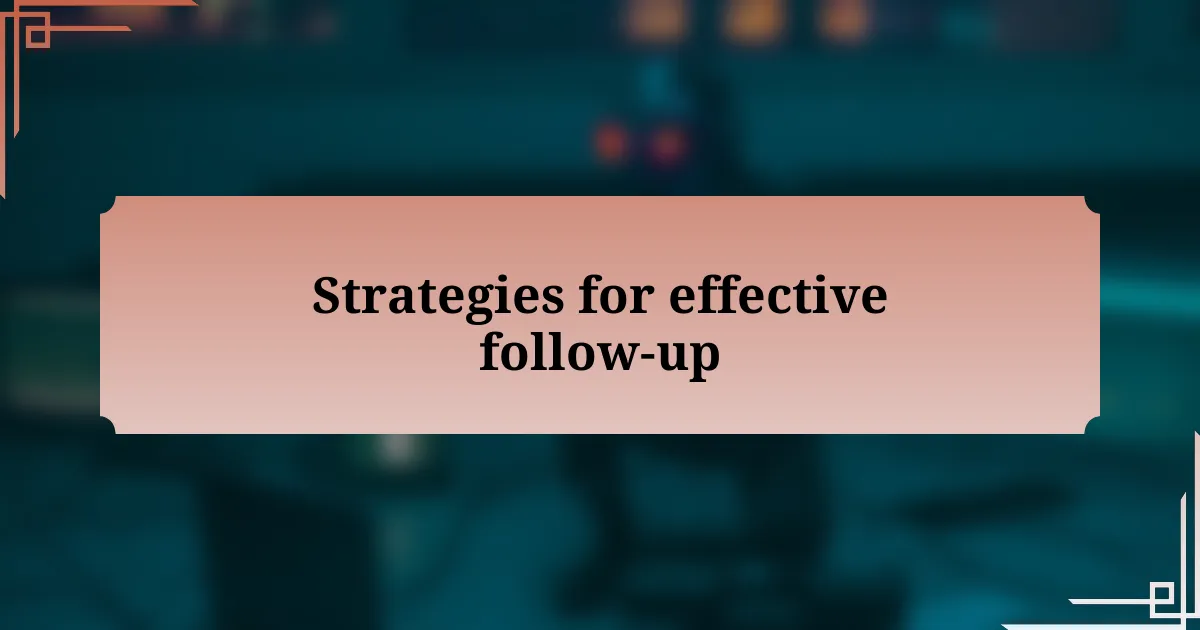
Strategies for effective follow-up
Following up after a tournament can often feel daunting, but I’ve found it to be a crucial step in building lasting connections. After a particularly intense event, I made it a point to reach out to those I had met. A simple message expressing how much I enjoyed our conversations can reignite that initial spark of connection. Have you ever noticed how a well-timed message can remind someone of that fleeting moment of camaraderie?
I also learned that personalizing my follow-up messages can significantly enhance their impact. For instance, after meeting a skilled player who had shared tips on dealing with in-game pressure, I referenced their advice in my message. This not only showed that I valued their insights but also created a sense of continuity in our conversation. Isn’t it incredible how a small detail can transform a generic follow-up into something meaningful?
Timing is essential when it comes to follow-ups, too. I remember once sending a message a week later only to receive a reply that felt distant. Now, I aim to follow up within a few days, while the event is still fresh in everyone’s mind. What do you think—does immediacy help solidify relationships better than waiting until later? It’s a constant balancing act, and I’ve found that the sooner you connect, the more likely you are to deepen that relationship.

